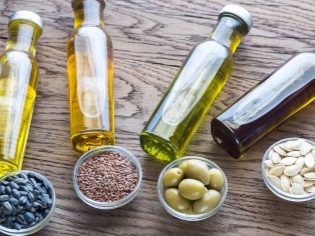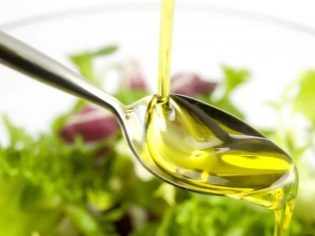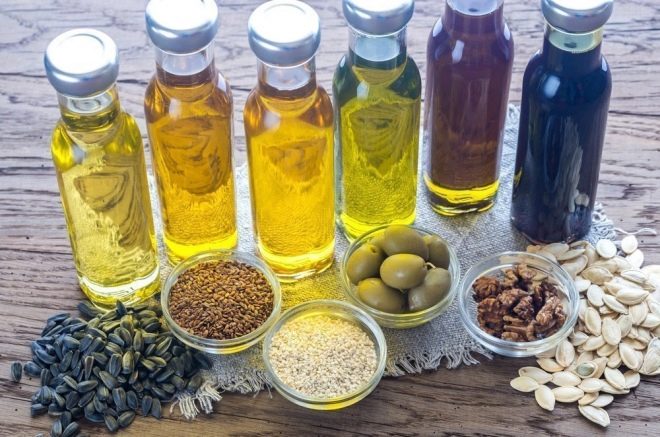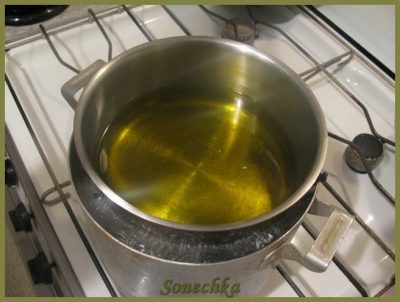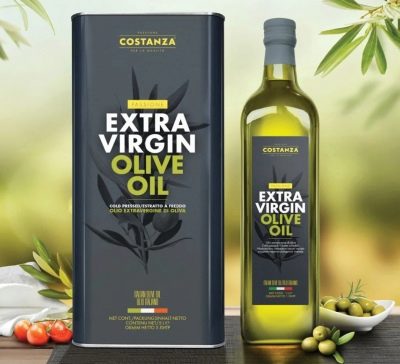Vegetable oil in the diet of children: at what age to give and what to consider?
Vegetable oil - one of the products with which the child meets in the first year of life. Therefore, by the beginning of the introduction of complementary foods, all mothers should find out at what age they are allowed to give vegetable oils to babies, why they are included in the children's menu, and which of the oils is best suited for feeding babies.
Benefit
Adding vegetable oils to the diet of babies is justified and necessary, because these products:
- include beneficial fatty acids that have a positive effect on the functioning of the nervous system and brain function;
- quickly absorbed and provide energy;
- help cleanse the body of harmful compounds;
- are a source of fat-soluble vitamins;
- help normalize stools and prevent constipation;
- envelop the walls of the stomach, preventing their damage;
- change the taste of dishes for the better;
- have a positive effect on the condition of the skin.
Possible harm
- Any type of vegetable oil can provoke an allergic reaction. Although it is very rare, it happens in the form of a rash, changes in stool, redness of the skin and other unpleasant symptoms. When they occur, a new product is temporarily excluded, and later on it is tried to be introduced into supplementary foods again.
- An excessively large amount of oil in the diet adversely affects digestion, damages blood vessels and the thyroid gland. In addition, this product is quite high in calories and consumption with excess can provoke weight gain.
- Prolonged heat treatment of vegetable oils leads to the formation of trans fats. Such compounds are dangerous for the child's body and can cause various pathologies, so their use at an early age is strictly limited.
- Expired oil or a product that was stored without observing the correct temperature, can also harm the baby and cause poisoning.
From what age, how much and how to give?
Most often, vegetable oil is added to vegetable or meat dishes. To all the nutrients are preserved as much as possible, the food should be slightly cooled.
Older kids are offered salads from fresh vegetables, seasoned with butter. Fried food should not be given until the age of three.
Breastfeeding
According to pediatricians, it is possible to acquaint babies with vegetable oil from 7 months of age. Until that time, babies receiving mother's milk do not need such a product.
- In 7 months a portion of vegetable oil for crumbs should be only 1 gram (that is, only a few drops, not more than 1/5 teaspoon).
- At 8 months old it can be increased to 2-3 grams, that is, give the toddler about half a teaspoon of oil per day.
- From 9 months daily portion of vegetable fatty product is 5 grams (one teaspoon).
- From 10 months of age - 6 grams (a little more than a teaspoon).
When artificial feeding
Vegetable oil can be offered to an artificial artist a little earlier - from 5 months.
- At 5 months of age The daily portion will be 1 gram of this product.
- In 6-7 months artificial feeding to children additionally give 3 grams of butter.
- In 8-9 months - 5 grams per day.
- From 10 months - Like babies, 6 grams per day.
What oil to choose in the feed?
The most common types of vegetable oils for baby food are olive and sunflower. It is their first recommended to include in the diet of babies up to a year.
Both products are refined and unrefined. The first of them is more purified, but less often provokes an allergy, therefore, it is first introduced into the supplement. In addition, unrefined oil has a pronounced smell and taste, so may not like the toddler.
- Olive oil It is obtained from the fruit of the olive tree and has a lot of positive properties. It is useful for immunity, cardiovascular, digestion and vision.
- Sunflower oil It is extracted from sunflower seeds and is almost as good as olive oil, because it contains many vitamins, and has a beneficial effect on the skin and intestines.
Less common, but may be included in the diet of children and such oils:
- corn - a nutritional source of vitamin E and linoleic acid, beneficial to skin cells and the immune system;
- coconut - contains saturated fatty acids, including lauric, which have an antimicrobial and antiviral effect, as well as medium chain triglycerides;
- rapeseed - rich in monounsaturated fats, phosphorus, vitamin E and omega fatty acids, has a positive effect on the circulatory and digestive systems;
- flaxseed - A valuable source of unsaturated acids, contributes to the normalization of metabolism, good digestion and immunity, but it has a specific taste;
- sesame - pleasant to the taste, contains a lot of calcium, phosphorus and fatty acids, therefore, helps to strengthen the teeth and bone system;
- peanut - a source of omega-6 and omega-9 fats, different vitamins and minerals, like many children with its original taste, useful for the cardiovascular system;
- soy - rich in tocotrienols and tocopherols, lecithin, vitamin C, various minerals, neutralizes toxins, improves metabolic processes and reduces cholesterol levels;
- sea buckthorn - contains carotenoids, vitamin C, tocopherol, vitamin K and other substances, helps strengthen the immune system, has a positive effect on the liver, promotes healing of wounds when applied externally.
These types of oils are recommended to add to the menu of children from 1 year, and with a tendency to allergies - even later. Peanut oils require special attention, because they often have side effects. In the reviews of their use in children, there are often complaints of allergies.
After the introduction of different types of oils into the children's diet, they should be alternated in the diet so that the kids get the maximum of nutrients from different foods.
Use with constipation
Vegetable oil is one of the harmless natural remedies that have a laxative effect. In most cases, constipation is used. sunflower oil. This is the most common oil and demand for violations of bowel movements. Its effect on the evacuation of the chair was noticed in ancient times.
This product can be used for constipation in babies, but with adequate dosage. Oil intake will have a positive effect on intestinal motility, relieve smooth muscle spasms and slightly accelerate the promotion of fecal masses due to lubrication of the intestinal walls and an increase in plasticity of feces.
However, in the first 6 months of life, this tool can not be used. Therefore, if constipation has appeared in a newborn, it is recommended to contact a pediatrician, and not give crumbs of oil, because the baby’s intestines are not yet fully ripe for digestion of this product.
1-2 drops are considered a safe dosage of oil for constipation in infants.Giving the product is more convenient with a pipette, dripping liquid on the baby's tongue. You can also oil the nipple (if the baby eats from the bottle) or the nipple (if the baby is breastfed).
Skin treatment and oil sterilization
Another area of application of vegetable oil in infants is the lubrication of the delicate skin of an infant. Apply such a product on the baby's skin is permissible from birth. It will easily relieve the crumbs of dryness and irritation, and many mothers consider it safer than special cosmetics.
The oil, which treats the skin of infants, must first be sterilized. This will help make the product safe for the toddler.
First, sterilize the glass container in which the oil will be stored. After that, you need to heat the jar with oil in a water bath, putting a small piece of cloth on the bottom. The water in the saucepan should be 1-2 cm higher than the level of oil in a jar.
Constantly stirring the butter with a wooden stick, it must be calcined for at least 20 minutes. For better effect, the product can be boiled for a little longer (30-40 minutes), until small bubbles appear in it.
The resulting sterile product can be applied to the skin of the child immediately after cooling. Keep it must be tightly closed with a lid.
It is not worth to sterilize a large volume at once, it is better to boil a new batch as you use it in a few days.
Selection and storage
The question of choosing a good vegetable oil for a child is very important. Do not buy cheap foods for baby food. As a rule, they are of lower quality, for example, they are poorly cleaned.
When choosing a product, carefully read about it on the packaging, check the expiration date, bottle integrity and storage conditions. When buying olive oil, pay attention to the presence of "organic" or "extra virgin" marks on the packaging.
Remember that oil should not be kept in sunlight. Choose a cool and dark place to store your home, such as a kitchen cupboard.
Keep track of storage periods, after opening the bottle, use the product for no longer than 5 weeks. The most suitable storage tank is glass. Storage temperature should not exceed +20 degrees.
Before you give the oil from the new packaging to the baby, check its smell and taste. If it smells unpleasant or rancid, it should not be used to feed children.

